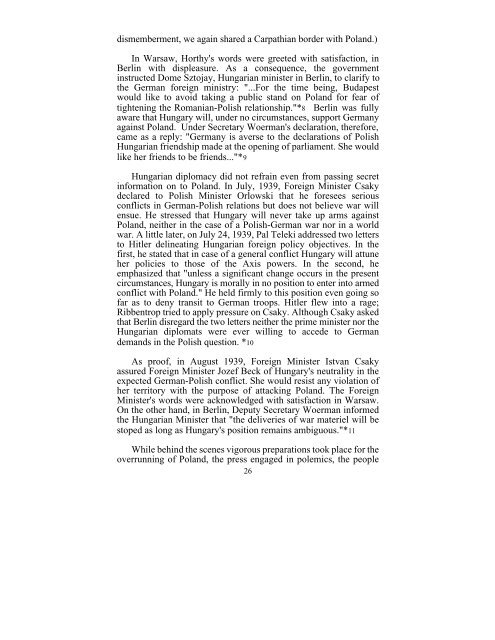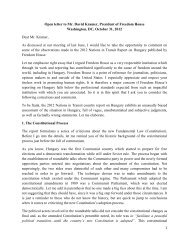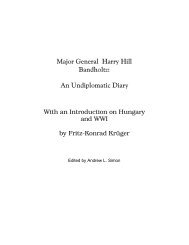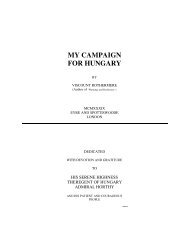the text - Corvinus Library - Hungarian History
the text - Corvinus Library - Hungarian History
the text - Corvinus Library - Hungarian History
You also want an ePaper? Increase the reach of your titles
YUMPU automatically turns print PDFs into web optimized ePapers that Google loves.
dismemberment, we again shared a Carpathian border with Poland.)<br />
In Warsaw, Horthy's words were greeted with satisfaction, in<br />
Berlin with displeasure. As a consequence, <strong>the</strong> government<br />
instructed Dome Sztojay, <strong>Hungarian</strong> minister in Berlin, to clarify to<br />
<strong>the</strong> German foreign ministry: "...For <strong>the</strong> time being, Budapest<br />
would like to avoid taking a public stand on Poland for fear of<br />
tightening <strong>the</strong> Romanian-Polish relationship."*8 Berlin was fully<br />
aware that Hungary will, under no circumstances, support Germany<br />
against Poland. Under Secretary Woerman's declaration, <strong>the</strong>refore,<br />
came as a reply: "Germany is averse to <strong>the</strong> declarations of Polish<br />
<strong>Hungarian</strong> friendship made at <strong>the</strong> opening of parliament. She would<br />
like her friends to be friends..."*9<br />
<strong>Hungarian</strong> diplomacy did not refrain even from passing secret<br />
information on to Poland. In July, 1939, Foreign Minister Csaky<br />
declared to Polish Minister Orlowski that he foresees serious<br />
conflicts in German-Polish relations but does not believe war will<br />
ensue. He stressed that Hungary will never take up arms against<br />
Poland, nei<strong>the</strong>r in <strong>the</strong> case of a Polish-German war nor in a world<br />
war. A little later, on July 24, 1939, Pal Teleki addressed two letters<br />
to Hitler delineating <strong>Hungarian</strong> foreign policy objectives. In <strong>the</strong><br />
first, he stated that in case of a general conflict Hungary will attune<br />
her policies to those of <strong>the</strong> Axis powers. In <strong>the</strong> second, he<br />
emphasized that "unless a significant change occurs in <strong>the</strong> present<br />
circumstances, Hungary is morally in no position to enter into armed<br />
conflict with Poland." He held firmly to this position even going so<br />
far as to deny transit to German troops. Hitler flew into a rage;<br />
Ribbentrop tried to apply pressure on Csaky. Although Csaky asked<br />
that Berlin disregard <strong>the</strong> two letters nei<strong>the</strong>r <strong>the</strong> prime minister nor <strong>the</strong><br />
<strong>Hungarian</strong> diplomats were ever willing to accede to German<br />
demands in <strong>the</strong> Polish question. *10<br />
As proof, in August 1939, Foreign Minister Istvan Csaky<br />
assured Foreign Minister Jozef Beck of Hungary's neutrality in <strong>the</strong><br />
expected German-Polish conflict. She would resist any violation of<br />
her territory with <strong>the</strong> purpose of attacking Poland. The Foreign<br />
Minister's words were acknowledged with satisfaction in Warsaw.<br />
On <strong>the</strong> o<strong>the</strong>r hand, in Berlin, Deputy Secretary Woerman informed<br />
<strong>the</strong> <strong>Hungarian</strong> Minister that "<strong>the</strong> deliveries of war materiel will be<br />
stoped as long as Hungary's position remains ambiguous."*11<br />
While behind <strong>the</strong> scenes vigorous preparations took place for <strong>the</strong><br />
overrunning of Poland, <strong>the</strong> press engaged in polemics, <strong>the</strong> people<br />
26
















